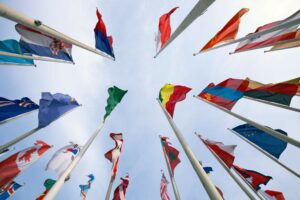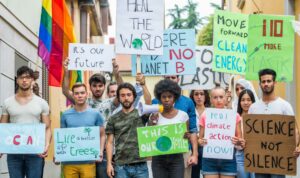Development research in remote communities continued during COVID 19 because of digital tools and local involvement. Researchers offer lessons in how to adapt.
This session was part of the NBS Sustainability Centres Community (SCC) Workshop 2021. The SCC connects business school sustainability centres worldwide.
Applied research in the field, particularly in remote communities, can encounter many challenges. For Fernanda Carreira and Daniela Gomes Pinto of FGV EAESP in São Paulo, Brazil, the COVID-19 pandemic was one such challenge. But many of their ongoing projects, including remote classes, continued despite COVID. In their SCC Workshop session, Carreira and Gomes Pinto shared how their research approach shifted during the crisis.
Watch the Session Video
Their projects in the Brazilian Amazon focused on local participation in development projects. During COVID-19, Carreira and Gomes Pinto were unable to visit the area, and some communities have no Internet or telephone access.
Continuing their project of engagement and local leadership meant combining many strategies. Here are some learnings that emerged for Carreira and Gomes Pinto during the COVID-19 pandemic:
-
Have a team of local researchers from the beginning of the project, and strengthen this team during crises. Local members of the research team enabled the research to continue.
-
Use technology the communities are already used to, which requires local listening. Not all technology is viewed equally. Make sure the technology fits with community interests and capabilities.
-
Involve young local leaders. When empowered, they can significantly help carry out a project.
COVID-19 meant that research with a local focus became even more grounded in and directed by the community.
About the SCC Workshop 2021
Every two years, the NBS Sustainability Centres Community Workshop connects leaders of business school sustainability centres for learning and action. This session was a part of the most recent Workshop in July 2021: “Designing the Business School Sustainability Centre of the Future.” See the main Workshop page for an overview and to access additional sessions.
The 2021 Workshop was hosted by the Center for Sustainability Transformation and Responsibility (STaR) at the Vienna University of Economics and Business and the Institute for Business Ethics and Sustainable Strategy (IBES) at the FH Wien University of Applied Sciences for Management & Communication.
See the Sustainability Centres Community homepage for additional information and to join the group.
Banner photo is taken by Marius Brand of WU Vienna, who gave us a great sense of what our conference would have felt like in Vienna, had it not been virtual.
About the Session Leaders
Fernanda Carreira, FGV EAESP
Fernanda Carreira is Head of the Integrated Education Program at FGVces (Brazil). Her areas of expertise are education for sustainability and organization strategies. Ms. Carreira has led projects of education for sustainability in Master and undergraduate courses, as well as applied research and projects in companies. At FGVces she has also coordinated a business platform called Companies for the Climate and was for 3 years the Executive Secretary of the Center, responsible for strategic planning, fundraising and institutional representativeness. Prior to FGVces, she had a six-year experience in advisory firms such as PwC and Edelman Significa, always in sustainability projects, and she has also worked at NGOs. PhD candidate in Organizational Studies, she holds a MsC in Management with an emphasis on Sustainability at FGV EAESP, where she also has a postgraduate degree in Sustainability Management and has a degree in Business Administration.
Daniela Gomes Pinto, FGV EAESP
Daniela Gomes Pinto is Head of the Local Development Program at FGVces (Brazil). Her areas of expertise are territorial governance and development, social and environmental impacts of large-scale mining and infrastructure projects, sustainability indicators and participatory approaches. Ms. Pinto has led projects in the Brazilian Amazon, in territories hosting the hydropower plants, federal roads, and the mining plants, as well as the collective construction of Guidelines for Large-Scale Projects in the Amazon partnering with the International Finance Corporation (IFC). Prior to FGVces, she was the Human Development National Report Coordinator at UNDP Brazil and has led the creation of the new Human Development Index at subnational level. She holds a bachelor’s degree in Geology (University of São Paulo), a master’s degree in Environment & Development (London School of Economics and Political Science) and is a Ph.D. candidate in Public Administration (FGV EAESP) and a Lecturer in the Master of Competitiveness Management – Sustainability (FGV).


Add a Comment
This site uses User Verification plugin to reduce spam. See how your comment data is processed.This site uses User Verification plugin to reduce spam. See how your comment data is processed.